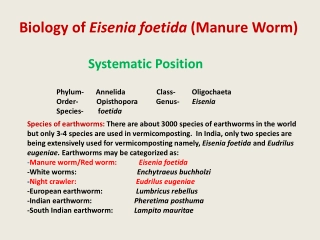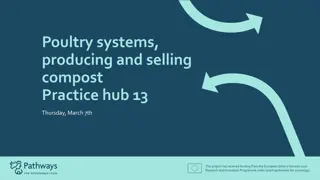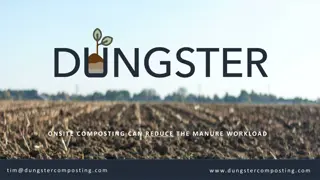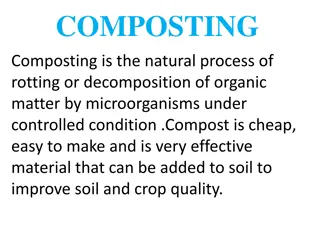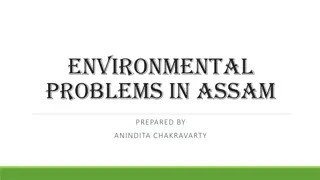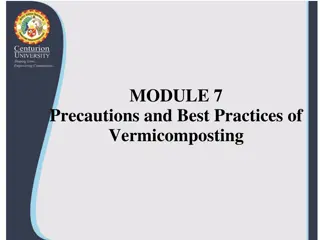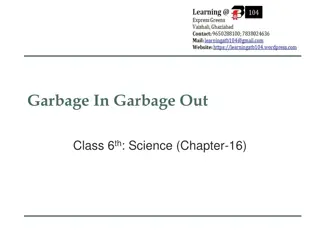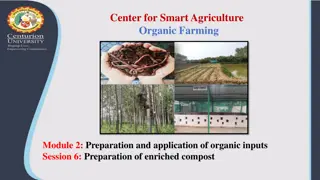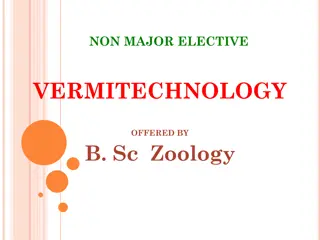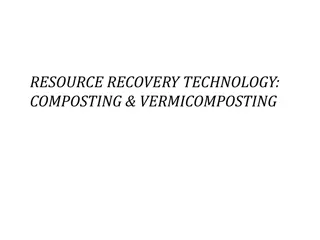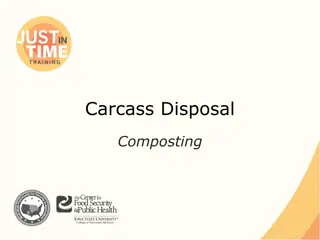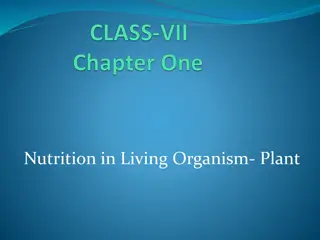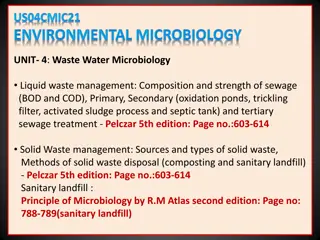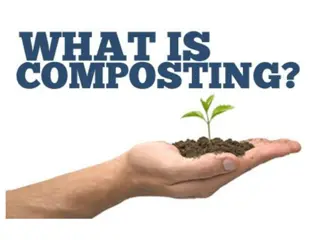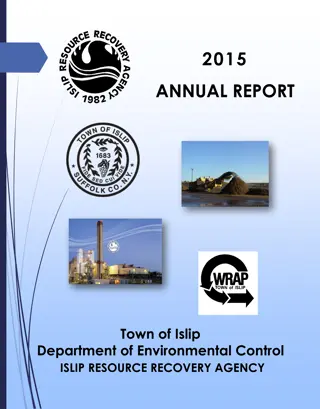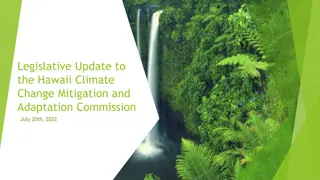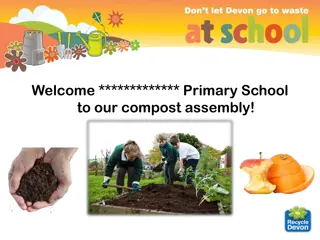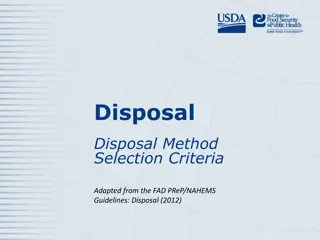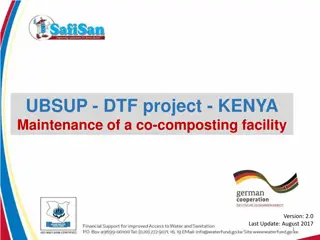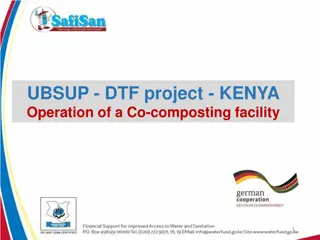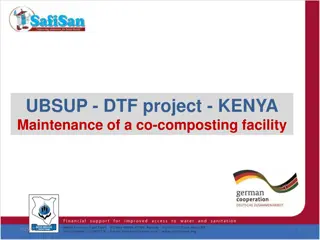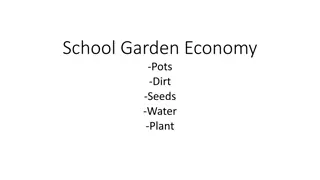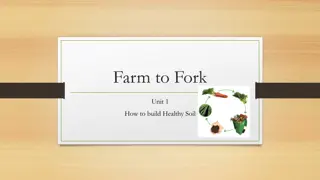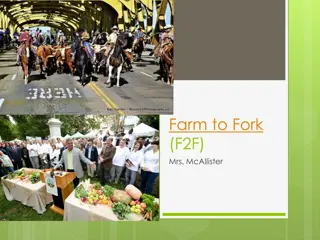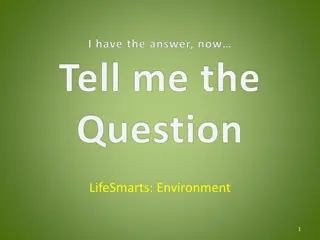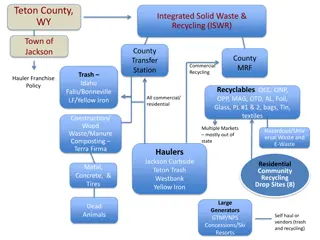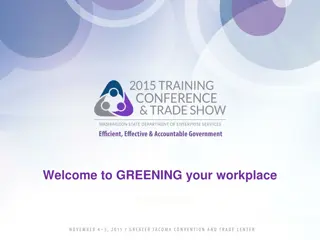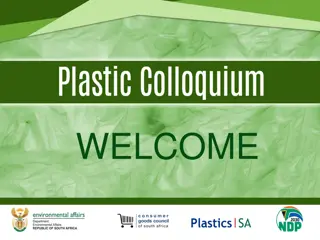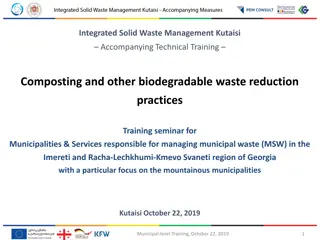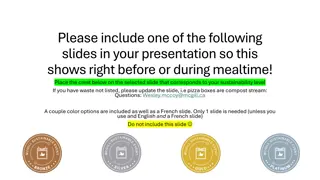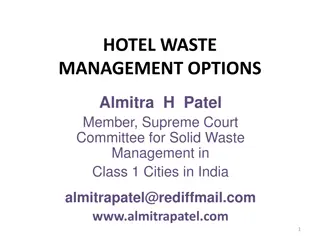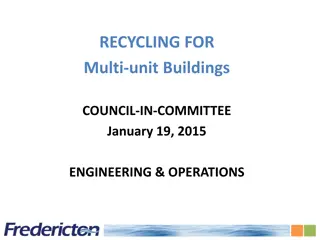Biology of Eisenia foetida (Manure Worm)
Learn about Eisenia foetida, a key earthworm species used in vermicomposting, its identification, ecology, efficiency, and morphology. Discover its burrowing habits, feeding behavior, reproduction capabilities, and environmental preferences for optimal performance in composting.
0 views • 25 slides
Embracing the Zero Waste Program at California State University, Los Angeles
California State University, Los Angeles is committed to achieving zero waste by repurposing bins, piloting Bigbelly stations, and expanding composting efforts. The Zero Waste Program aims to minimize landfill waste by recycling and composting valuable resources, guided by ethical and sustainable pr
3 views • 13 slides
Farmer Cooperative's Innovative Poultry Composting Project
Farmer cooperative Fertil Eveil is leading an innovative project focused on producing and sharing compost from plant-based litter within a Practice Hub environment. With multiple composting platforms established in France, the cooperative aims to improve nutrient management and assess the impact of
3 views • 6 slides
Efficient On-Site Composting Methods for Reducing Manure Workload
On-site composting can significantly reduce the workload associated with managing manure on small farms. By following principles of economy of effort and the O.H.I.O principle (Only Handle It Once), manual loading methods and efficient composting techniques can transform manure into valuable compost
6 views • 19 slides
Effective Methods of Composting for Sustainable Soil Enrichment
Composting is a natural process of organic matter decomposition, beneficial for improving soil quality. The Bangalore Method, Construction of Pit, Filling the Pit, Modified Bangalore Method, and Padegaon Method are efficient techniques used to produce high-quality compost for agricultural purposes.
0 views • 13 slides
Environmental Challenges in Assam: Solid Waste and Deforestation Issues
Assam faces critical environmental problems such as solid waste mismanagement and deforestation. The syllabus emphasizes three main issues: solid waste management, deforestation, and watershed management. Solid waste, categorized by origin, hazard potential, and contents, poses significant challenge
0 views • 15 slides
Precautions and Best Practices of Vermicomposting
Learn the essential precautions and best practices for successful vermicomposting. Discover the ideal earthworm species, suitable materials, protection methods, watering tips, and post-composting care. Follow temperature, moisture, pH guidelines, avoid certain materials, and maintain proper drainage
0 views • 7 slides
Managing Garbage: A Comprehensive Overview for Class 6 Science
This educational material delves into the science of garbage management, covering topics such as types of garbage, how to deal with garbage, components of garbage, recycling, composting, vermicomposting, and the impact of plastics on the environment and health. It emphasizes the importance of proper
0 views • 14 slides
Enhancing Compost Quality for Organic Farming: Phosphorous-Enriched Compost Preparation
Composting is a natural process crucial for organic farming. Enriched compost improves nutrient supply to crops. Learn how to prepare phosphorous-enriched compost using organic wastes, bio-inoculants, and rock phosphate. Follow a method involving layering organic materials, cow dung, and rock phosph
3 views • 8 slides
Vermitechnology and Composting: Sustainable Waste Management Solutions
Solid waste management is crucial in the face of increasing urbanization. Composting and vermitechnology offer natural and effective ways to treat organic waste, with earthworms playing a key role in bioconversion processes. Utilizing organic wastes like animal manure, crop residues, and food waste,
1 views • 12 slides
Guide to Operating a Co-composting Facility in Kenya
Explore the operations of a co-composting facility in Kenya through detailed images and descriptions. Learn about the areas within the co-composting shed, materials required, composition of windrows, and the process of turning windrows in the co-composting project. Discover the ideal combinations of
1 views • 20 slides
Understanding Composting and Vermicomposting Technology
Composting and vermicomposting are controlled decomposition processes of organic materials, with aerobic microbes breaking down the matter in the presence of oxygen. Aerobic composting produces stable humus and helps eliminate pathogens and weed seeds. The processes involve microbial respiration, ga
1 views • 29 slides
Effective Carcass Disposal Through Composting
Composting carcasses with organic materials can accelerate biological decomposition, destroy pathogens, and produce a nutrient-rich humus. Proper carbon-to-nitrogen ratios, moisture levels, oxygen maintenance, and temperature control are crucial for the efficiency of the composting process. Mixing a
0 views • 21 slides
Explore LifeSmarts: Environment - Promoting Sustainability and Awareness
Discover ways to protect our environment, from conserving water and improving air quality to preserving habitats and embracing the mantra "Less is More, Use It Again." Learn about recycling, reducing waste, composting, and the importance of surface water and groundwater. Uncover the significance of
0 views • 29 slides
Understanding Nutrition in Plants and Their Relationship with the Environment
This educational content delves into the various modes of nutrition in plants, including heterotrophic and autotrophic nutrition, as well as saprotrophic and parasitic nutrition. It explains the process of photosynthesis, absorption of water through roots, oxygen production, and symbiotic relationsh
0 views • 13 slides
Effective Strategies for Sustainable Weed Management
Discover sustainable weed management strategies involving identification, proper tools for control, composting techniques, organic production methods, and practical tips such as preventing weeds from seeding, cost-effective cultivation practices, and the benefits of cover cropping. Understanding the
1 views • 20 slides
Understanding Waste Water Microbiology and Solid Waste Management
Waste water microbiology involves the analysis of liquid waste in terms of its composition, strength (BOD and COD), and treatment processes. It covers the sources and types of solid waste, along with methods of disposal like composting and sanitary landfilling. The chemical characteristics of waste
0 views • 36 slides
Understanding the Fundamentals of Composting
Compost is organic matter decomposed into a valuable fertilizer and soil amendment. The process involves aerobic decomposition of waste material, turning it into nutrient-rich humus. Composting requires a mix of organic matter, water, air, and proper carbon:nitrogen ratio for efficient breakdown. Th
0 views • 21 slides
Town of Islip Department of Environmental Control Annual Report 2015
The Islip Resource Recovery Agency and the Department of Environmental Control manage solid waste services for Islip town residents, including recycling, waste-to-energy, composting, and C&D debris facilities. They also emphasize recycling education and operate the Islip Animal Shelter. The Blydenbu
0 views • 13 slides
Hawaii Climate Change Legislative Update July 2022
Hawaii's recent legislative updates focus on climate change mitigation and adaptation, emphasizing goals for greenhouse gas emission reduction, renewable energy standards, energy efficiency measures, and clean transportation initiatives. The state is also implementing programs to incentivize carbon
0 views • 9 slides
Engaging Compost Assembly for Primary School Students
Explore the interactive compost assembly at a primary school, covering topics like the importance of composting, what can be composted, the process of composting, and ways for everyone to participate. The assembly features engaging visuals and a compost chant, encouraging students to take action in
0 views • 9 slides
Guidelines for Animal Disposal Methods
Environmental and biosecurity guidelines recommend various disposal methods such as composting, rendering, permitted landfill, unlined burial, fixed-facility incineration, and open-air burning. Each method has specific selection criteria and considerations to minimize risks to the environment and bi
0 views • 17 slides
Guidelines for Maintaining a Co-Composting Facility in Kenya
Learn about the moisture and temperature control requirements for managing a co-composting facility in Kenya. Discover troubleshooting tips for addressing issues such as odors, climatic influences, and vectors. Follow step-by-step instructions to monitor temperature levels and ensure efficient compo
0 views • 8 slides
Guide to Co-composting Facilities Operation in Kenya and Benin
Explore the user's guide for operating a co-composting facility in Kenya and Benin, covering areas such as material storage, composition of windrows, and the co-composting process. Learn about the ideal layers for windrows, turning schedules, and creating the perfect balance of nitrogen and carbon f
0 views • 22 slides
Maintenance and Troubleshooting Guidelines for Co-composting Facility in Kenya
Learn about moisture control, temperature management, and troubleshooting tips for a co-composting facility in Kenya. Ensure proper moisture content between 40% to 60%, monitor temperature changes weekly, and troubleshoot odor and climatic influences effectively. Follow user guides and protocols for
0 views • 8 slides
Sustainable School Garden Economy Initiative
Empowering schools to establish a sustainable garden economy with initiatives like plastic pot recycling drives, composting biomass, classroom seed competitions, water conservation strategies, and plant sales. The program encourages hands-on learning, environmental stewardship, and community involve
0 views • 6 slides
Building Healthy Soil Through Composting: A Practical Guide
Learn how to build healthy soil through composting in this comprehensive guide. From creating compost piles to understanding the decomposition process, discover the benefits of composting for reducing waste and improving soil quality.
0 views • 4 slides
Farm to Fork (F2F) Movement at RCHS - Growing Wholesome Food Locally
The Farm to Fork (F2F) initiative at RCHS promotes growing and consuming locally sourced food to support the environment, local economy, and community awareness. The program involves cultivating organic produce for the cafeteria, educating students and families about F2F principles, and fostering le
0 views • 10 slides
Exploring Environmental Awareness in LifeSmarts: Water, Air Quality, and Habitats
Delve into the world of environmental consciousness with LifeSmarts, focusing on water conservation, air quality improvements, and habitat protection. Learn about sustainable practices like reducing waste, recycling, and composting. Discover the importance of surface water, groundwater, and runoff i
0 views • 29 slides
Waste Management Overview in Wyoming and Idaho Counties
Explore the waste management strategies in Teton County, WY; Fremont County, ID; Madison County; and Bonneville County. Learn about integrated solid waste and recycling programs, landfill operations, recycling drop-off locations, hazardous waste disposal, and partnerships with recycling facilities.
0 views • 5 slides
Greening Your Workplace: Why and How to Implement Organic Composting and Recycling
There are compelling reasons to go green at your workplace, such as preserving natural resources, setting a positive example for employees, improving efficiency, and creating a healthier work environment. Discover the benefits of installing organic composting and recycling systems in your facility a
0 views • 21 slides
Sustainable Solutions: Biodegradable Polymers in South Africa
Exploring the significance, challenges, and infrastructure needs of biodegradable polymers in South Africa. Discusses the importance of bio and organic recyclables as substitutes for non-recyclable polymers, along with concerns about market contamination and industrial composting. Highlights the dev
0 views • 9 slides
Technical Training Seminar on Integrated Solid Waste Management in Georgia
Training seminar focusing on composting and biodegradable waste reduction practices for Municipalities in the Imereti and Racha-Lechkhumi-Kmevo Svaneti region of Georgia. The program aims to raise awareness, provide knowledge, and enhance planning capacities for sustainable waste management.
0 views • 6 slides
Sustainable Waste Sorting Guidelines at Mealtime
Attendees at a certified sustainable event are urged to responsibly sort their waste after meals. The options include composting, recycling, and landfill streams for specific items like food scraps, drink cans or bottles, disposable plates and cutlery. Help maintain sustainability by following these
0 views • 5 slides
Sustainable Hotel Waste Management Options
Explore various sustainable waste management options for hotels including on-site food waste management, biogas production, composting, animal feed utilization, feeding food leftovers to pigs, and sharing excess food with those in need. These eco-friendly practices help minimize waste and promote a
0 views • 9 slides
Recycling Initiatives in Multi-Unit Buildings: A Comprehensive Overview
This report outlines the various recycling services provided to residents living in multi-unit buildings, including solid waste collection, curbside collection, depot collection, special collections, and composting. It also discusses curbside diversion rates, recycle depot tonnage from 2009 to 2014,
0 views • 21 slides
